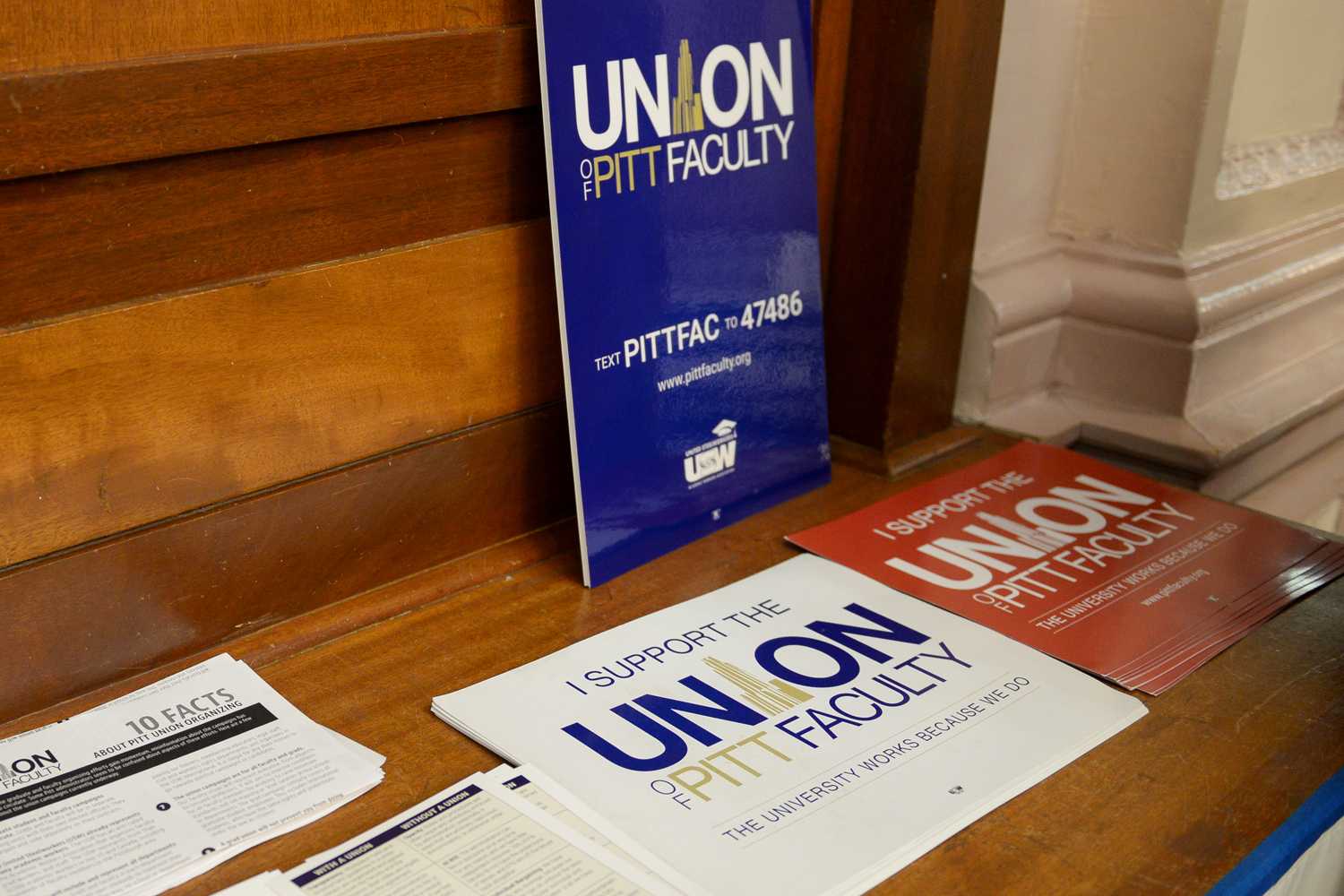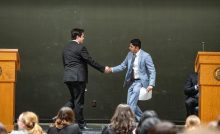Part 1 | Who did Pitt include on its list of union-eligible faculty?


Faculty union organizers challenged hundreds of the names Pitt included in its list of faculty eligible for a bargaining unit.
This article is the first part of an in-depth series about Pitt’s faculty union campaign. Read the introduction here.
Union organizers have long estimated that around 3,500 faculty at Pitt are eligible to be in a faculty union, citing employment numbers from the University factbook, which Pitt is legally obligated to publish every year. The University, however, included more than 4,000 faculty on the union’s eligibility list.
A June analysis by the United Steelworkers determined that up to 783 people do not belong on the list. The Pitt News obtained more than 100 of those names and found that the “unjustified inclusions” fall into three distinct categories — administrators, graduate students and faculty who retired or left Pitt years ago.
Administrators:
Documents presented by USW at the July hearings reveal that Pitt’s list included 76 “administrators.” Most held the rank of assistant or associate dean, but some were ranked as high as vice provost.
pittfac_administrators_union_ex_10A total of 15 deans work at Pitt — one for each school — and that’s not including dozens more vice deans, associate deans and assistant deans. Some hold faculty appointments, and may teach one or two courses per year. But since deans’ roles involve managing faculty employment contracts and negotiating salaries, they normally sit on the opposite end of the bargaining table from faculty, according to Tyler Bickford, an associate professor in the English Department.
That typically doesn’t change when faculty form a union. The Public Employe Relations Act, which governs union policy in the public sector, states that supervisors cannot be in a bargaining unit with other employees. The Act defines “supervisor” as anyone who has the authority to hire, suspend, lay off, promote or fire employees.
Every administrator included on Pitt’s list supervises several dozen faculty and has at least some say in their department’s hiring, firing and recruitment processes, because, as deans, they control employment contracts.
One administrator on the list has publicly testified on behalf of the administration in the PLRB’s graduate student union hearings. On Oct. 4, 2018, when graduate students were still fighting for the right to unionize, Associate Dean Holger Hoock testified as a witness for the University administration.
Five months after those hearings, the University included him on the list of faculty eligible for the union’s bargaining unit.
The Pitt News asked Hoock three times in a period of 10 days to answer questions regarding his administrative role and his stance on faculty unionization. He did not respond to requests for comment.
“The entire point of a union is to give faculty a voice [to stand up to] the administration,” McAndrew said. “Now, administrators could upend the union from the inside.”
Bickford said there’s “practically no chance” that administrators such as deans will end up in the final bargaining unit, but “you never know what [the University’s] gonna pull.”
On the second day of hearings, the administration’s lawyers submitted a revised list from USW’s original list of 76 administrators, with only 14 people whom they said were not administrators and therefore eligible to vote. Pitt spokespeople would not explain why the other 62 names were removed.
pittfac_administrators_admin_exceptions_redactedWhen asked via email to comment on organizers’ allegations that Pitt broke the law, Chancellor Patrick Gallagher and Provost Ann Cudd did not respond. University spokesperson Kevin Zwick declined to make Gallagher, Cudd or any top officials available for an interview.
Zwick said Pitt denies all wrongdoing, and that the University followed procedures and processes set by the PLRB.
“The University of Pittsburgh has never attempted to stall a union election or taken any action to oppose the faculty unionization efforts,” Zwick said. “What the University has done is follow the PLRB process and worked to ensure that faculty members have information — presented in a fair and accurate manner — to draw their own conclusions.”
Faculty who no longer teach at Pitt:
Faculty who no longer teach at Pitt — retired professors and those who have quit or left for other universities — make up the largest portion of unjustified inclusions, numbering several hundred, organizers claim.
The Pitt News obtained names of more than 30 professors emeritus who were included on the union eligibility list. Though a few professors emeritus teach an occasional class at Pitt, they are, by definition, retired.
pitt emeritus per mgmt 2019-07-12
Pitt’s website has documented the retirements of many faculty on the list above. David Brumble and Lucy Fischer retired from the English department in 2017 and 2018, respectively.
Both Van Beck Hall and Seymour Drescher appear on the department of history’s retired faculty page, though the page doesn’t specify which year each professor retired. Neither has responded to questions about when they retired or most recently taught classes.
Kathryn Puskar was associate dean for undergraduate education before she became a professor emeritus of nursing in 2019, so, according to organizers, she would’ve been ineligible for the bargaining unit even before she retired.
Marina Antic, an inclusion not on the professors emeritus list above, is now an assistant professor at Indiana University. She hasn’t taught at Pitt since 2009.
According to precedent set by Temple University’s faculty union, the most recent precedent for state-related schools like Pitt under the jurisdiction of the PLRB, faculty must have taught in each of the past two semesters — fall 2018 and spring 2019, when applying the precedent to Pitt — to be eligible for a faculty union bargaining unit. Part-time faculty who only teach recurring courses during one semester of the year must have taught in each of the last two years to be eligible.
Temple adjunct election eligibility stipulation 2015Hundreds of faculty included on the list haven’t taught in the last two or three years, let alone the past year, organizers claim.
When asked why Pitt went against precedent set by Temple, Zwick said “there are many precedents for what makes someone a regular part-time employee that have been used across different educational institutions that look at different time periods and apply different standards.”
Zwick did not respond to questions about which precedents Pitt considered when putting together the list of faculty eligible for a union.
Graduate students:
The University included several graduate students on the list it sent to the PLRB, a couple of whom were also eligible to vote in April’s graduate student union election, according to organizers.
Students who hold graduate appointments — teaching assistant, teaching fellow, graduate student assistant or graduate student fellow — that make them eligible for a graduate student union cannot simultaneously hold faculty appointments that would make them eligible for a faculty union, according to USW.
But graduate students can, in some cases, attain faculty status. When graduate students run out of funding in their final years and exhaust their available opportunities as TAs, TFS, GSAs or GSFs, the department can hire them in an adjunct or lecturer role.
Zwick said the list includes a “small number of graduate students” who received faculty appointments separate from their academic programs.
Organizers said they can’t find any evidence that graduate students on the list hold faculty appointments. But public records don’t enumerate an individual’s academic appointments. Only private employment records, which organizers have subpoenaed from the University, would reveal that information. It’s doubtful that graduate students were justifiably included on the list, organizers say, but still possible.
Some of Pitt’s peer institutions, such as Rutgers, include graduate assistants and teaching assistants within their faculty union, because they have an umbrella union for all individuals with research and teaching appointments.
Pitt, however, has a separate graduate campaign trying to unionize more than 2,000 teaching assistants, teaching fellows, graduate assistants and graduate student researchers.
Read the rest of this series:
Recent Posts
Notes From an Average Girl // Notes on Book Banning
In this edition of Notes From an Average Girl, senior staff writer Madeline Milchman writes…
To Be Honest // Yup, it is that damn phone
In this edition of To Be Honest, staff writer Evin Verbrugge writes about her phone…
Meaning at the Movies | Portraying Toxic ‘Adolescence’
In this edition of Meaning at the Movies, staff writer Lauren Deaton explores the mini-series…
Opinion | Climate change requires radical, immediate action
Contributing editor Emma Hannan talks about the effects of climate change and the actions cities…
Jaland Lowe enters transfer portal, becomes fifth Panther to jump ship
On Tuesday morning, it was announced on X that Pitt sophomore guard Jaland Lowe was…
College Democrats and Republicans debate pressing political topics
Around 100 students gathered to watch Pitt’s College Democrats and College Republicans debate a variety…

